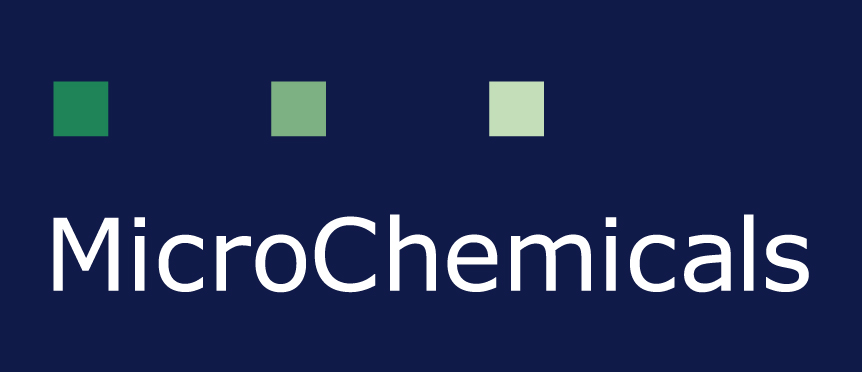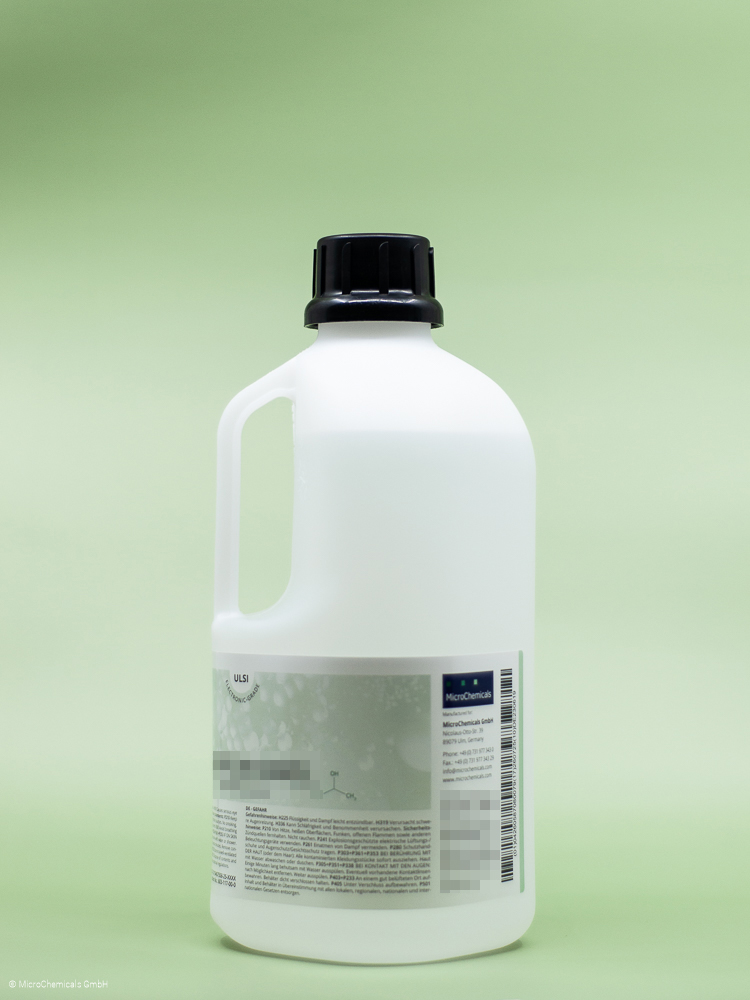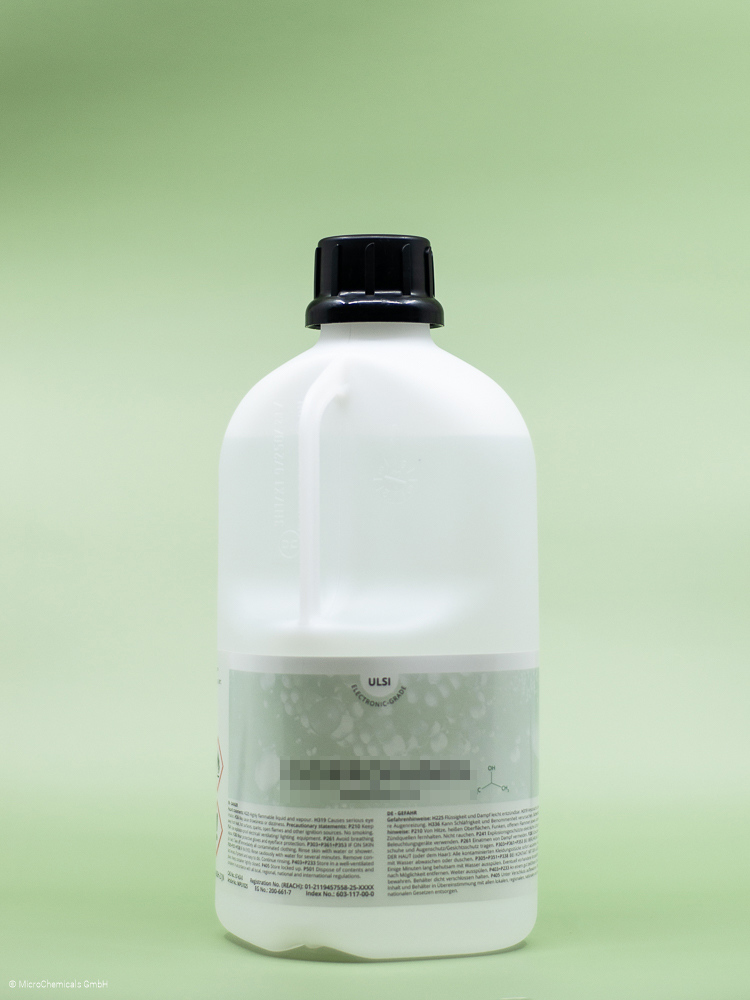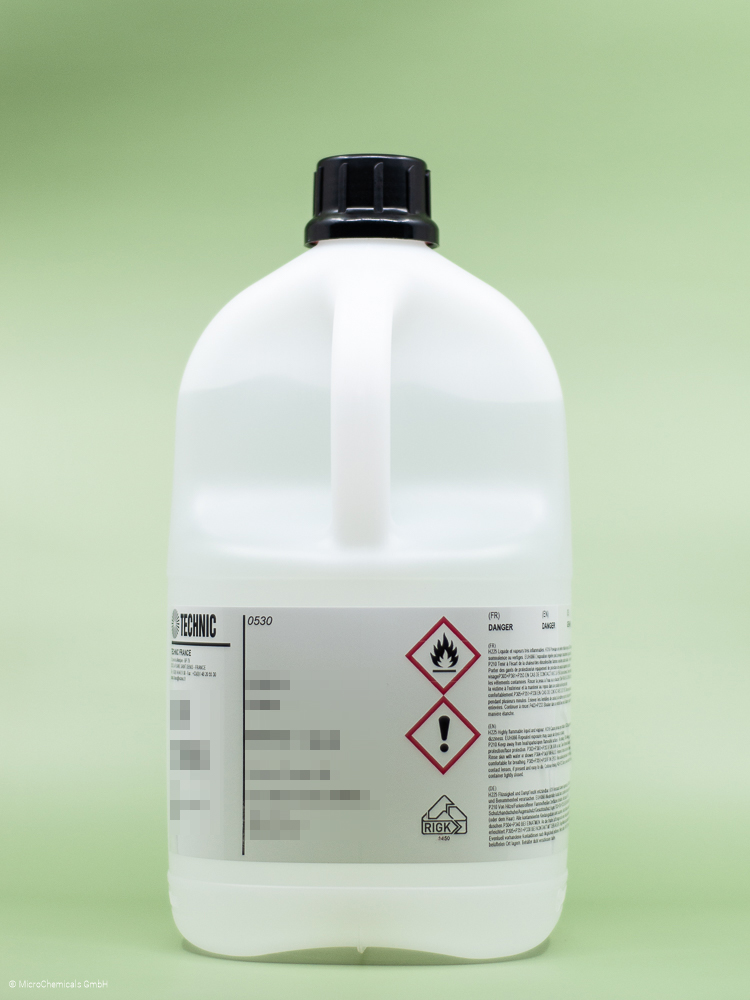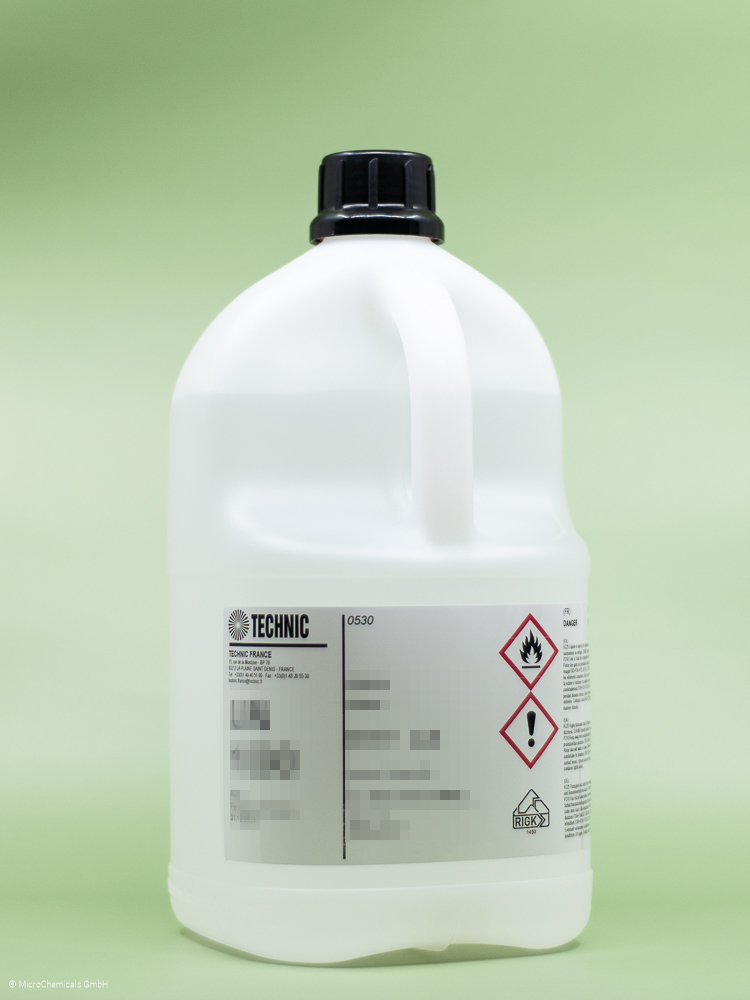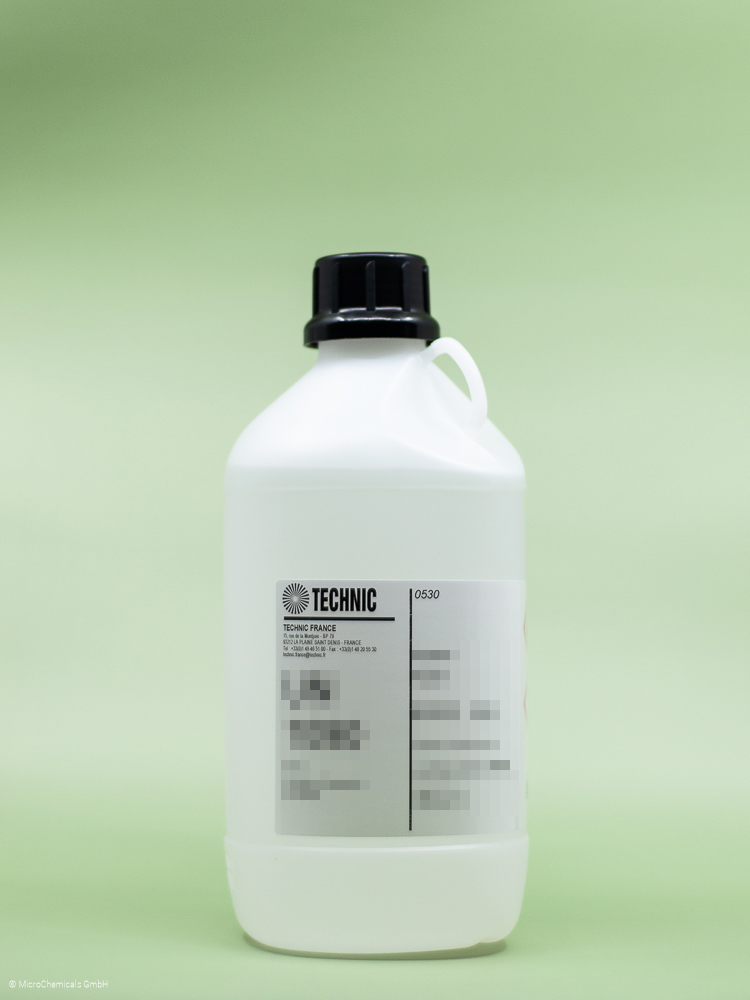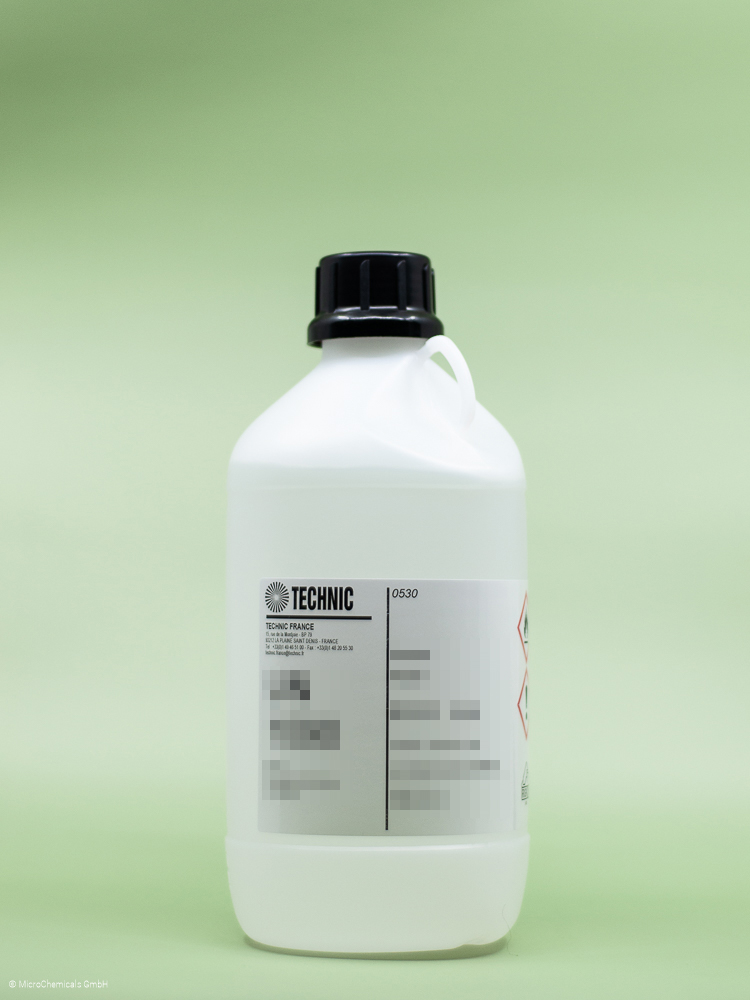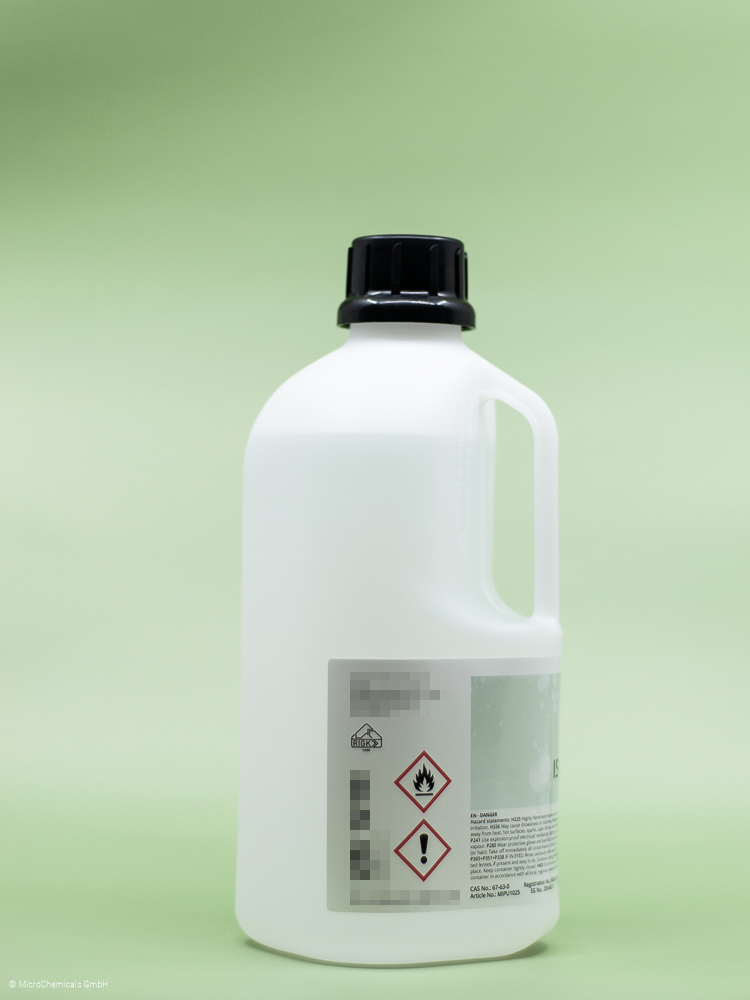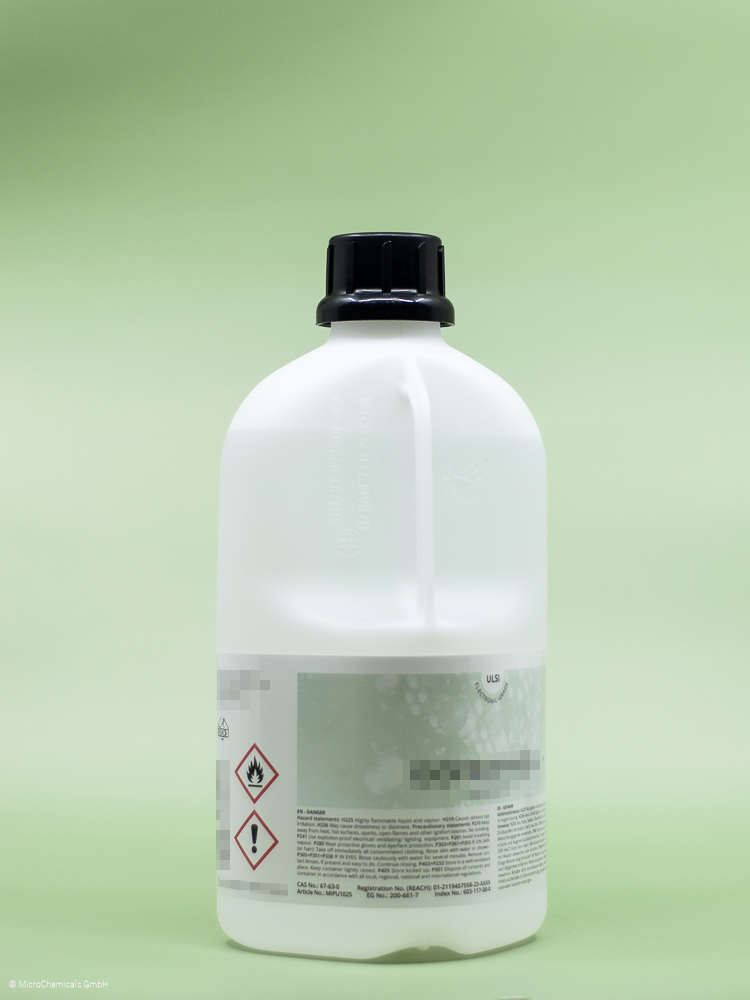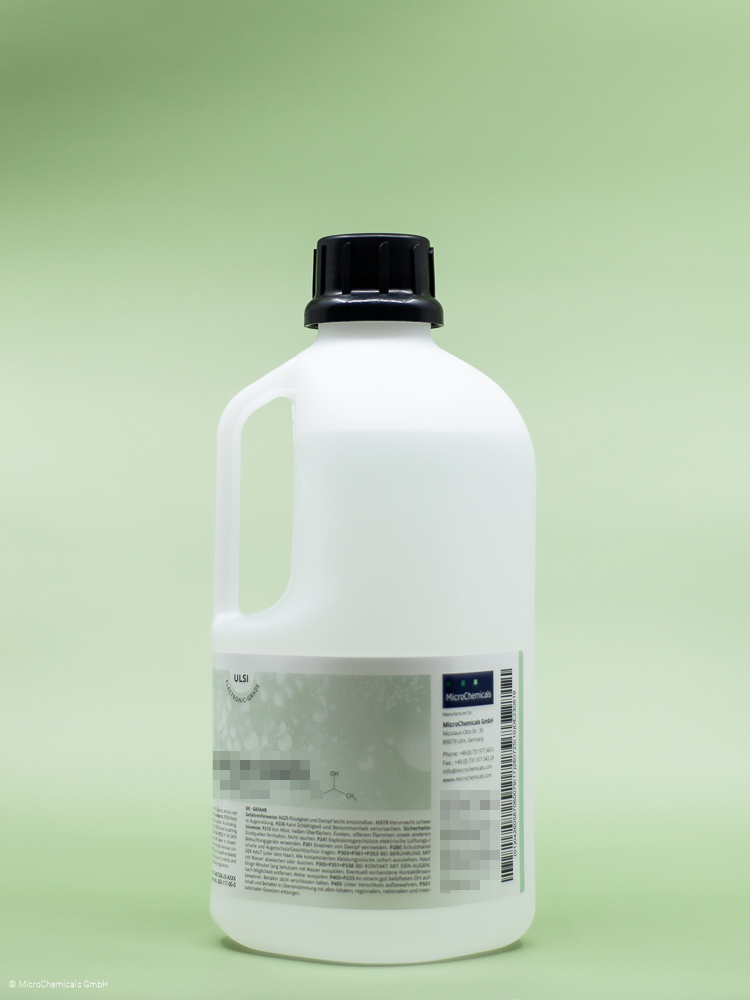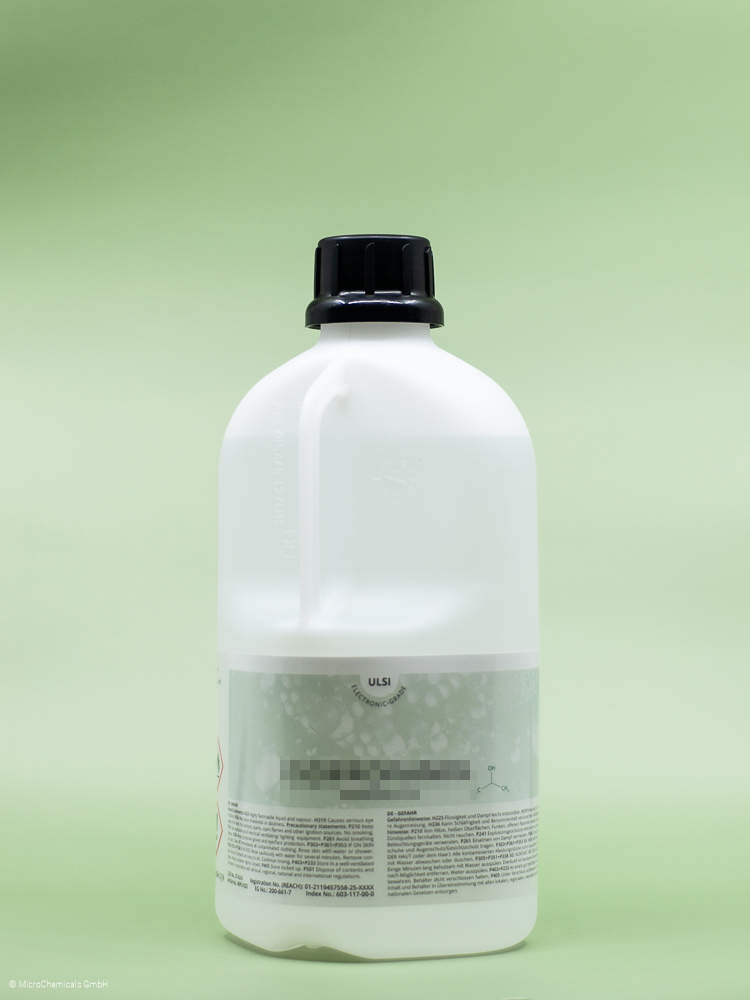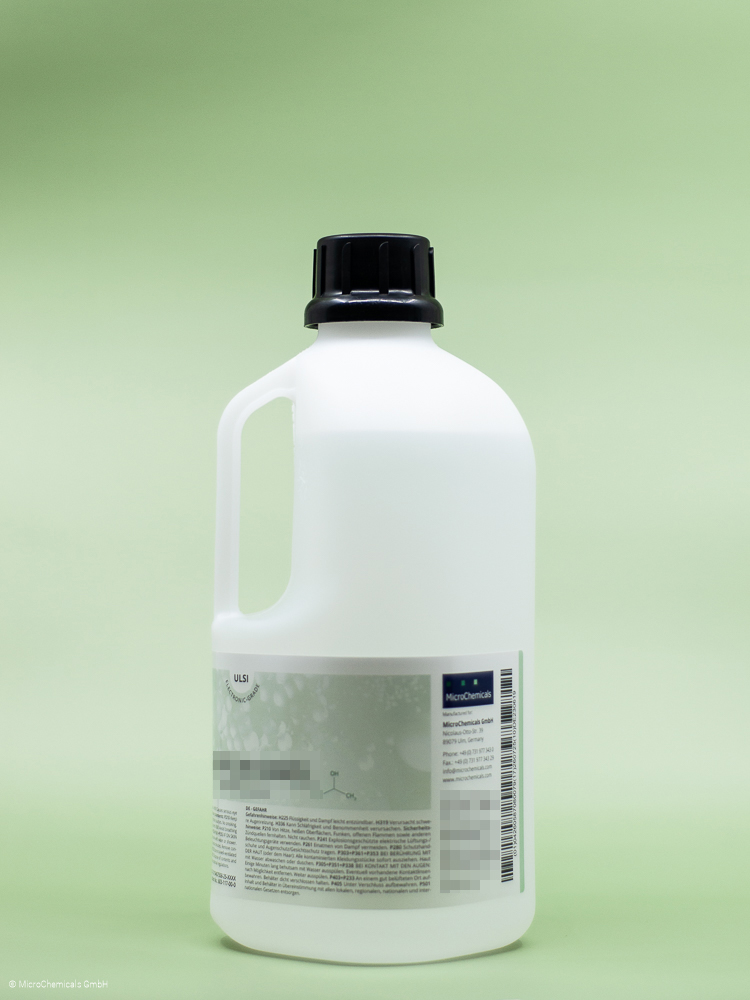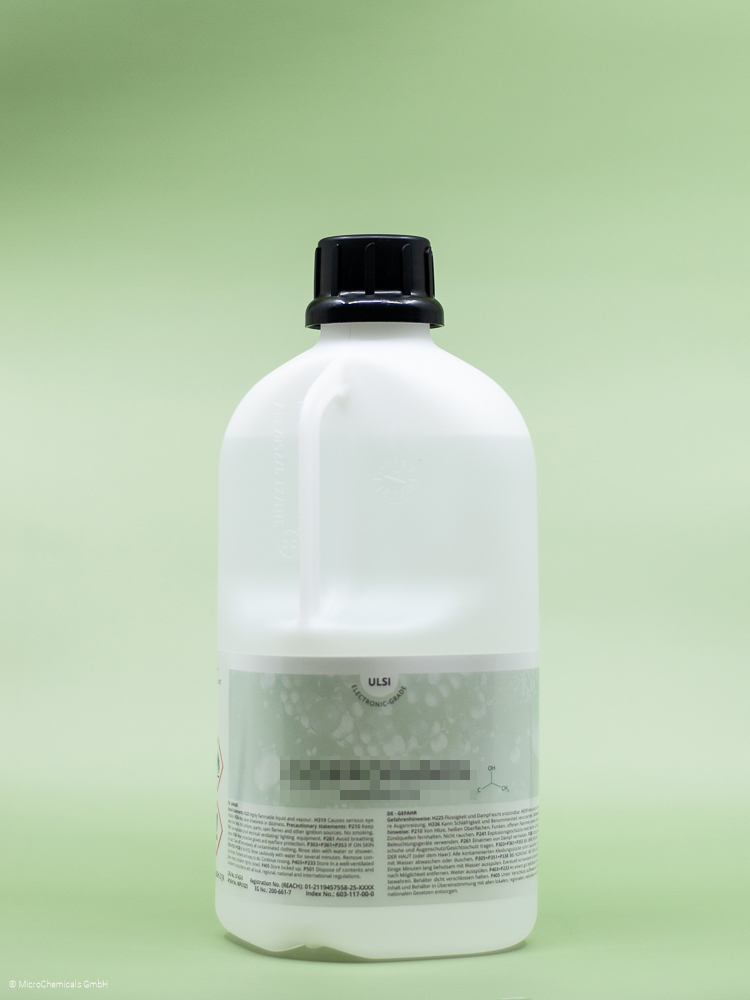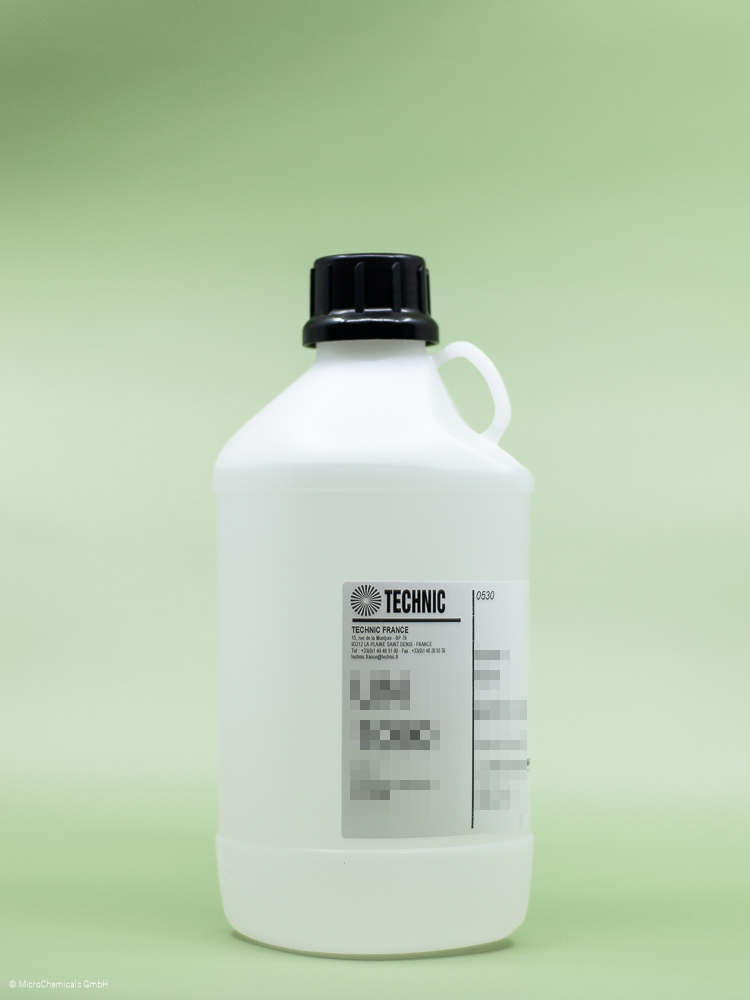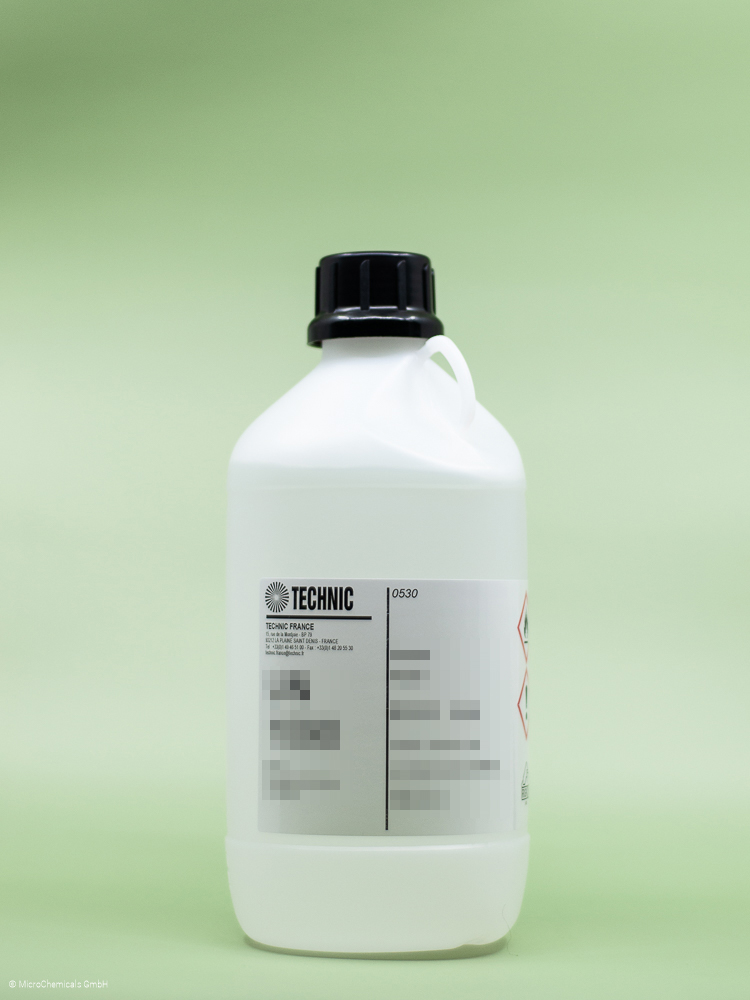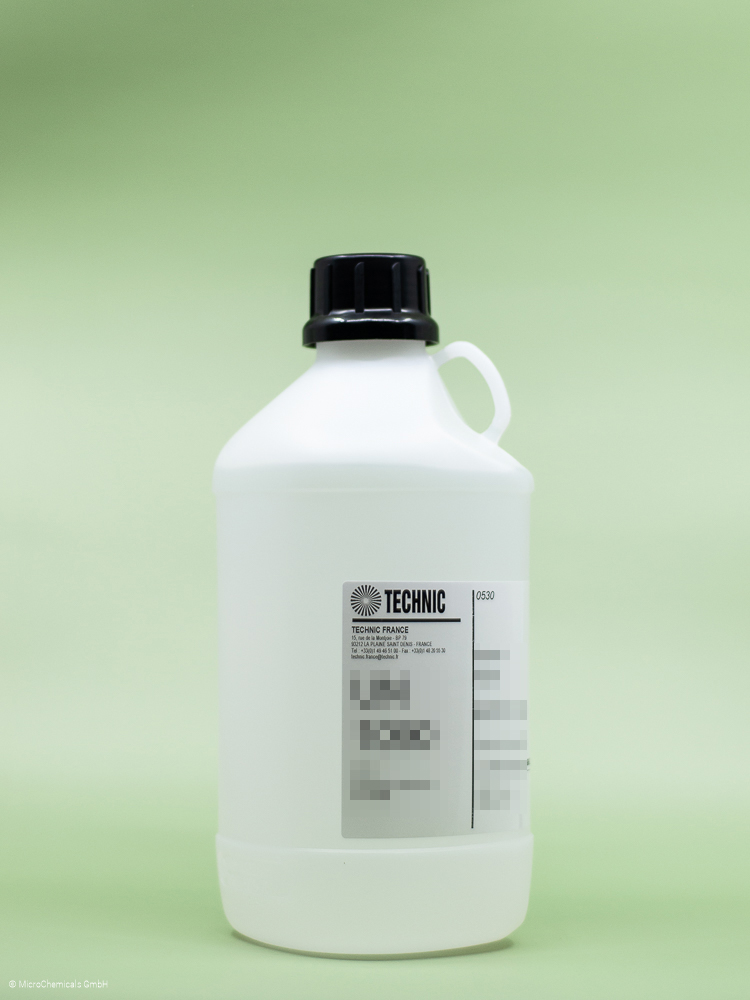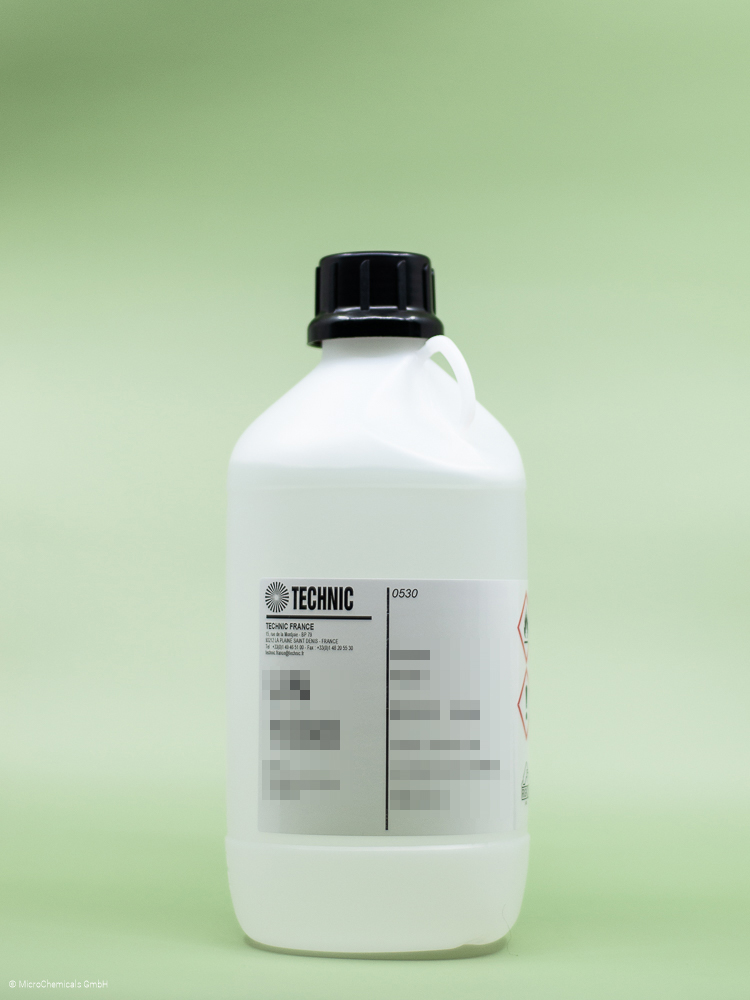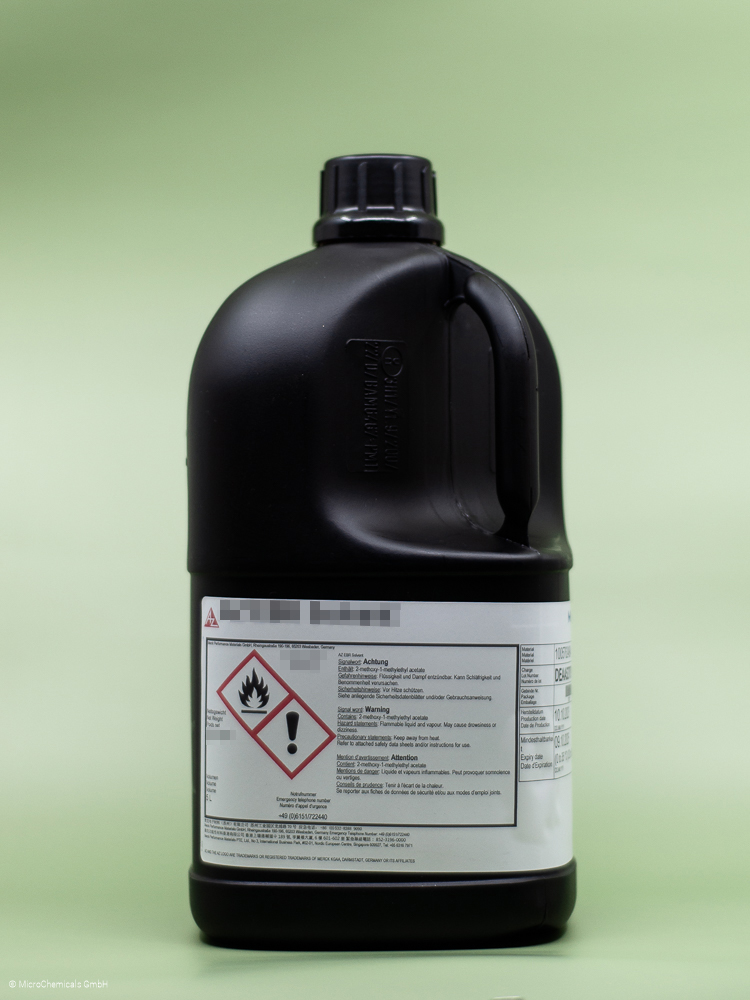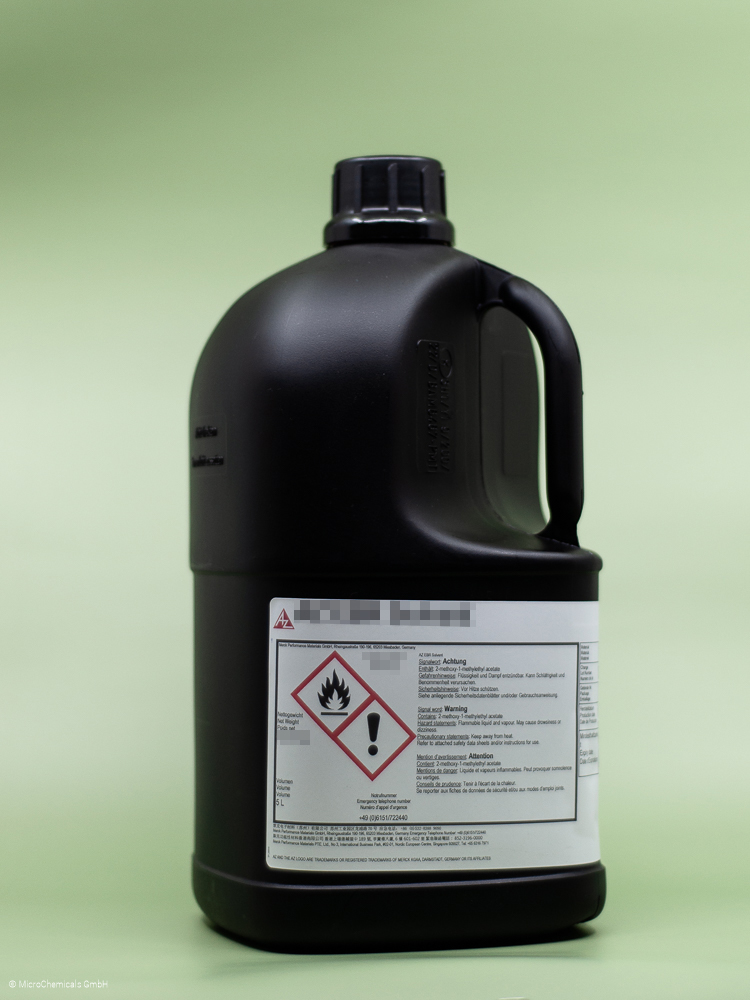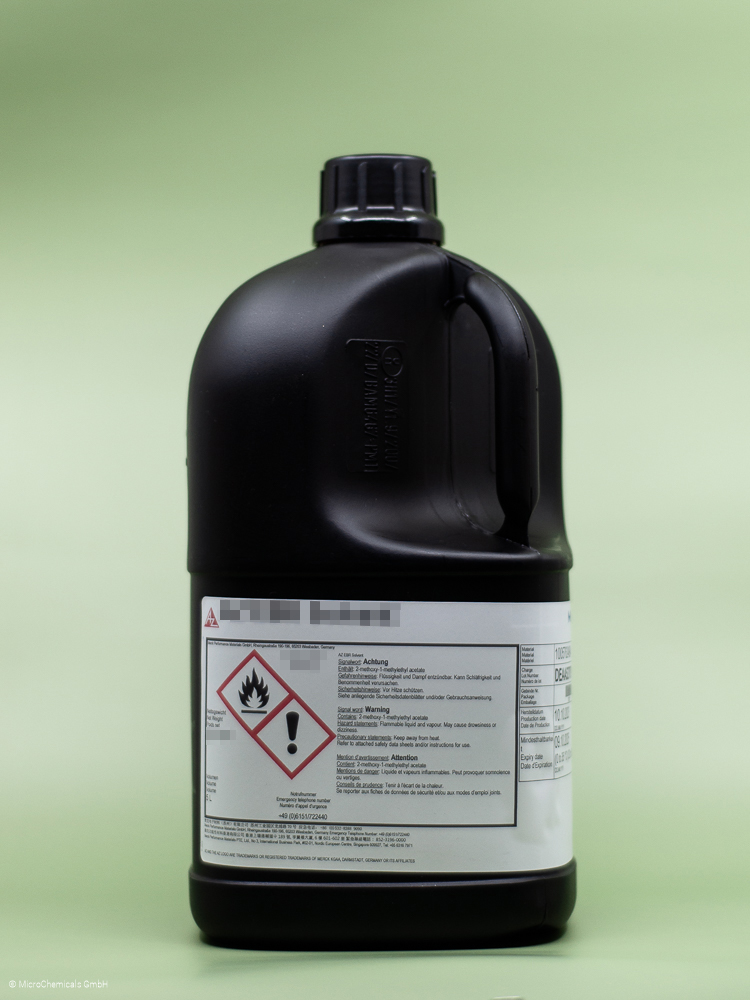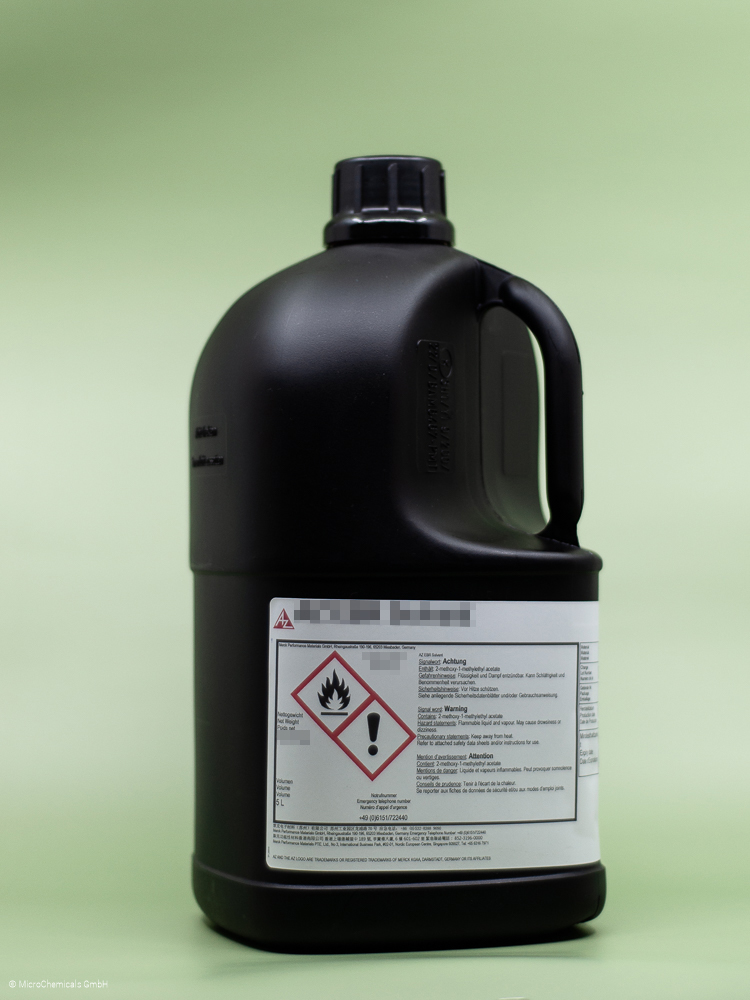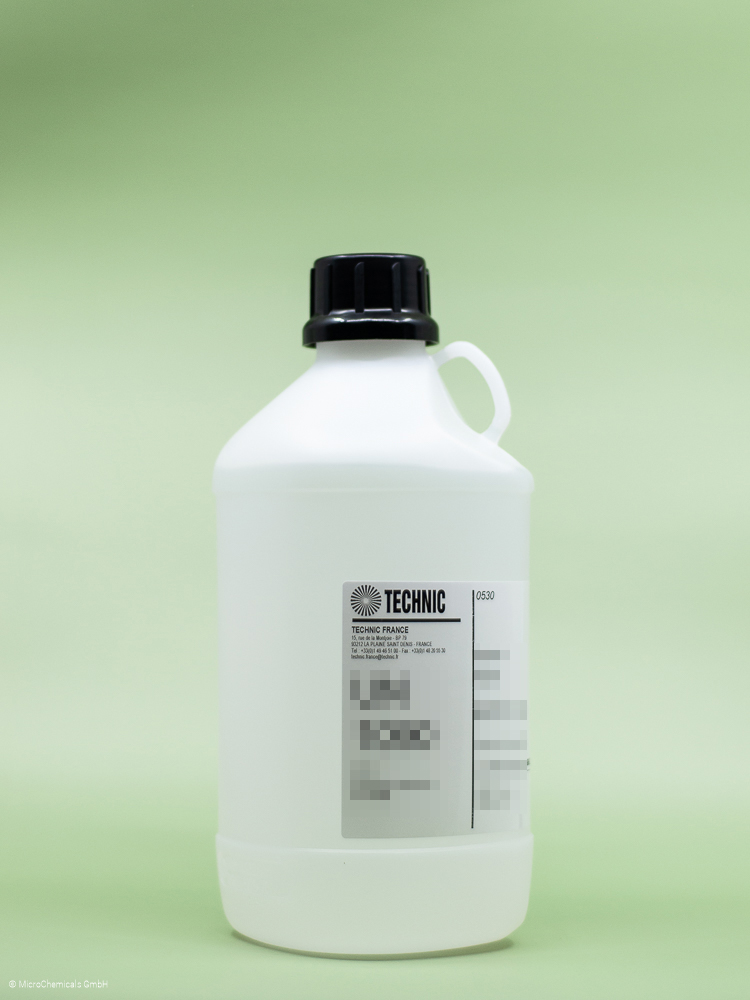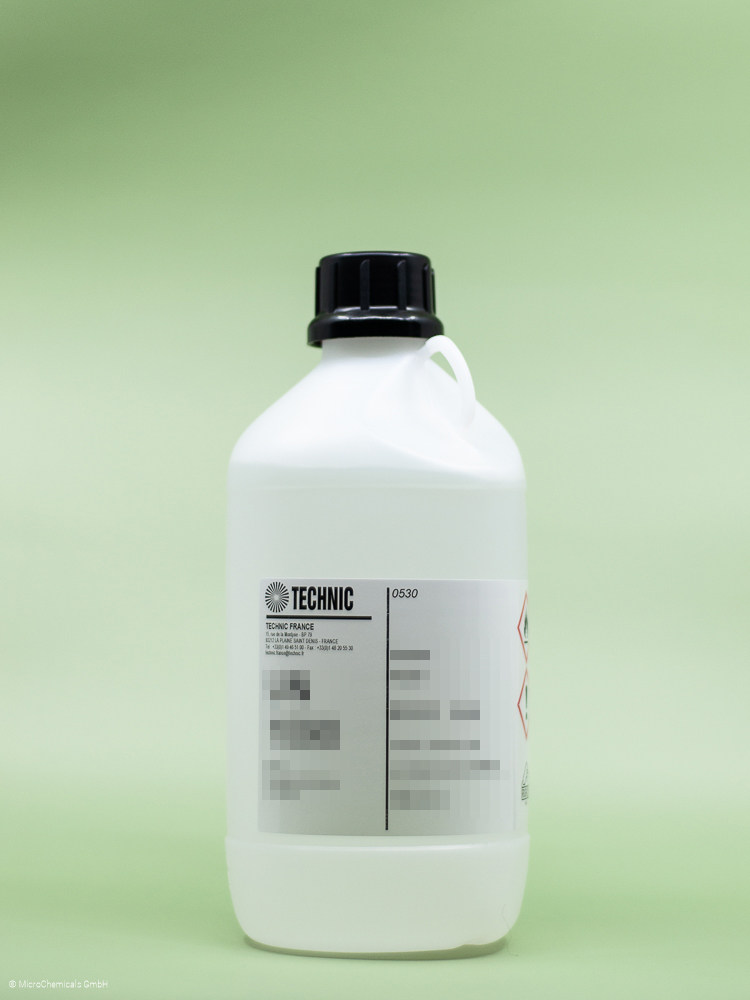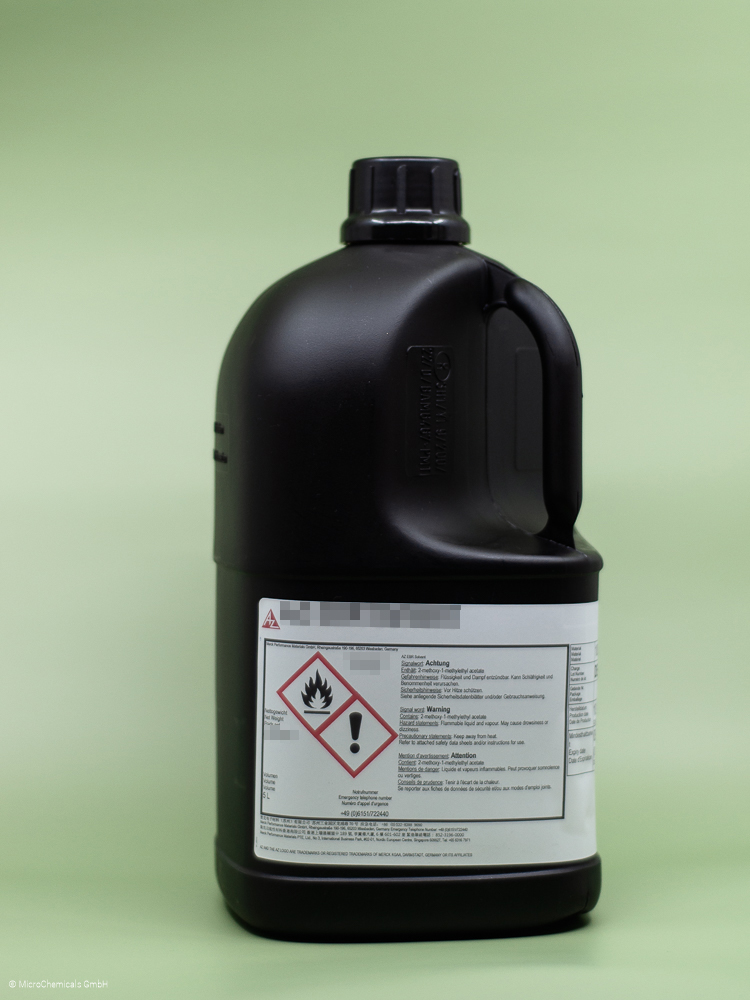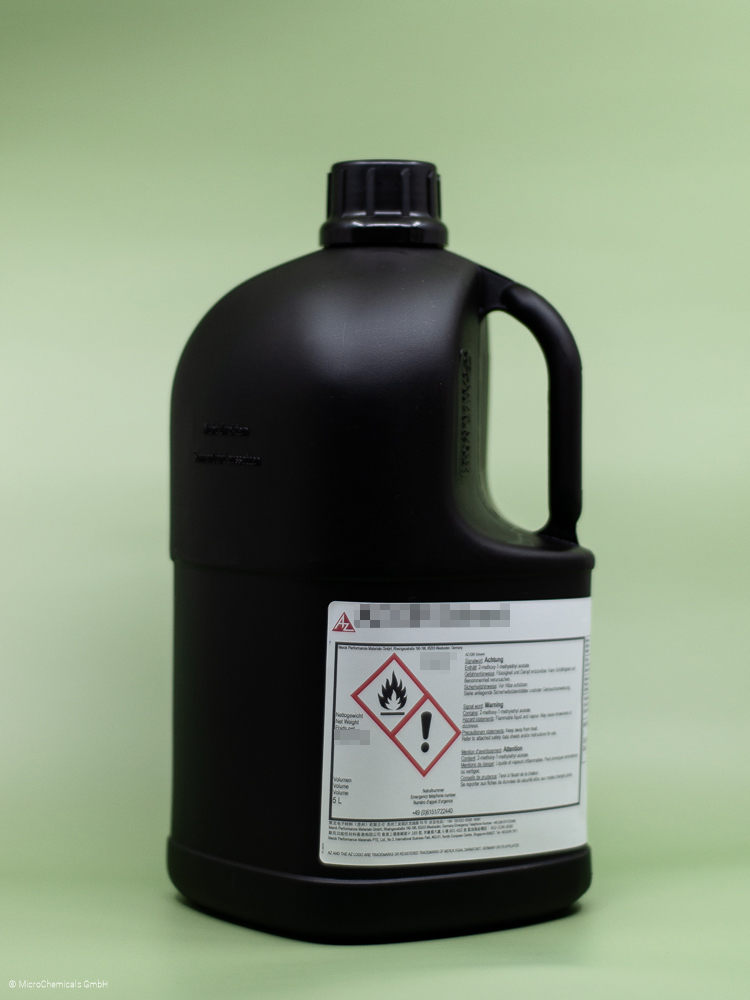AZ EBR 70/30 - 5.00 l
Merck Performance Materials GmbH
AZ® EBR Solvent 70/30 is the main solvent of almost all our photoresists and can be used for dilution and edge bead removal.
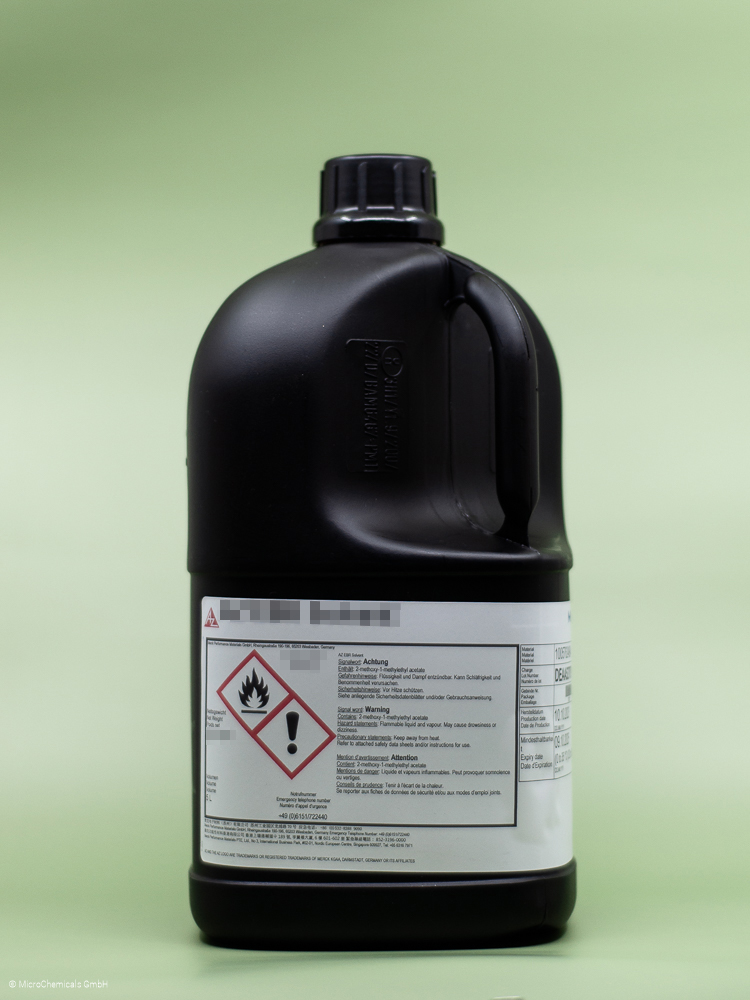
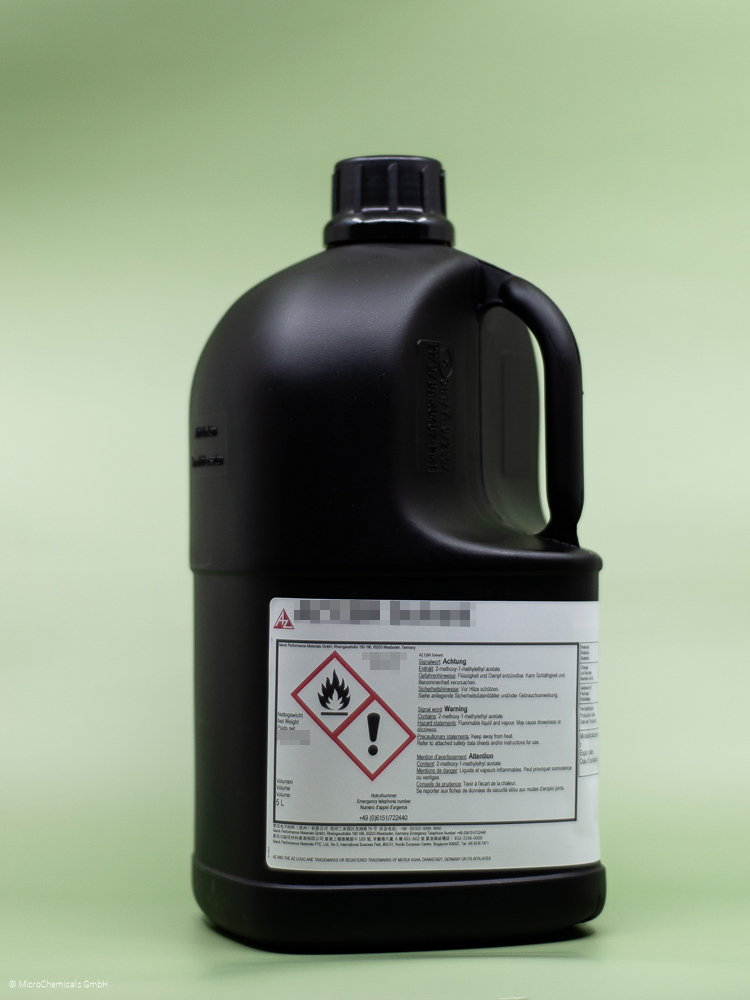
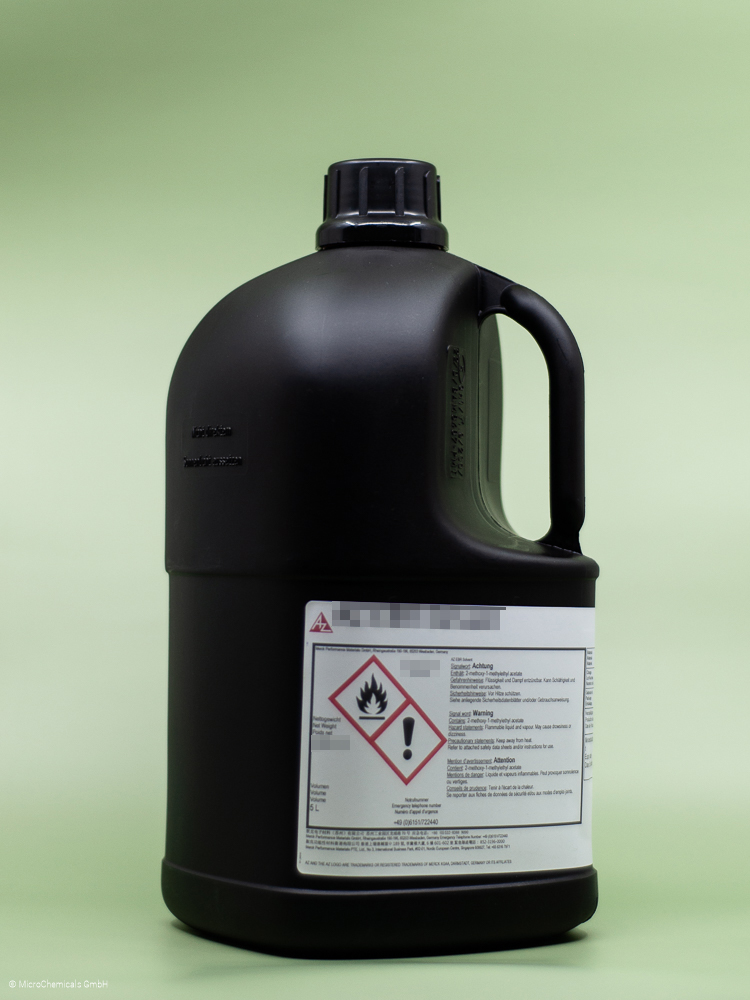









The prices are visible after registration.
Send us an inquiry if you have any questions about articles, purchase quantities, delivery times or sample requests!
Product number:
1070302
Manufacturer:
Merck Performance Materials GmbH
Product information "AZ EBR 70/30 - 5.00 l"
AZ® EBR Solvent 70/30
1-methoxy-2-propyl-acetate
General Information
AZ® EBR Solvent 70/30 is the main solvent/thinner of almost all AZ® and TI photoresists due to its low vapour pressure and its suppression of particle formation in the (further diluted) resist. Additionally, PGMEA is often used for edge bead removal, since its low vapour pressure prevents further thinning of the coated resist film.
Product Properties
- Density: 0.97 g/cm3
- Melting point: -66°C
- Boiling point: 125°C
- Flash point: 45°C
- Vapour pressure @ 20°C: 5 hPa
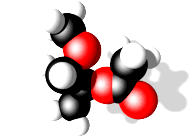
PGMEA Molecule
Further Information
MSDS:
Safety Data Sheet AZ® EBR Solvent 70/30 english
Sicherheitsdatenblatt AZ® EBR Solvent 70/30 german
TDS:
Technical Data Sheet AZ® EBR Solvent 70/30 english
Information AZ® EBR Solvent 70/30 english
Related products
Acetone MC - 2.50 l - ULSI - EUD/EVE!
MACU1025
Manufacturer:
MicroChemicals GmbH
|
Bottle size:
2.50 l
|
Purity:
ULSI
Acetone
CH3COCH3
General Information
Acetone removes organic impurities from substrates and is well suited for greasy/oily contaminations. However, its large vapour pressure causes rapid drying together with a resorption of the contaminants on the substrate. Therefore an immediately subse¬quent rinsing step is recommended with a higher boiling solvent such as isopropanol.
Acetone is not well-suited as lift-off medium due to the high fire danger when heated and the trend of particles to be lifted to resorb onto the substrate.
Product Properties
Density: 0.79 g/cm^3
Melting point: 95°C
Boiling point: 56°C
Flash point: < -18°C
Vapour pressure @ 20°C: 244 hPa
Acetone Molecule
Further Information
MSDS:
Safety Data Sheet Acetone english (TECHNIC France)
Sicherheitsdatenblatt Aceton german (TECHNIC France)
Safety Data Sheet Acetone english (MicroChemicals GmbH)
Sicherheitsdatenblatt Aceton german (MicroChemicals GmbH)
Specs:
Specs Acetone ULSI (TECHNIC France)
Specs Acetone VLSI (TECHNIC France)
Specs Acetone ULSI (MicroChemicals GmbH)
Application Notes:
Solvents english
Lösemittel german
n-Butylacetat - 5.00 l - VLSI
TNBAV1050
Butyl Acetate
C6H12O2
General Information
Butyl Acetate is a solvent with a boiling point of 127°C. The vapour pressure at room temperature is 10.7 hPa. Butyl Acetate has the chemical formula C6H12O2. It can be easily solved in nonpolar (organic) solvents, but fairly bad in water (4.3 g per Litre).
Product Properties
Density: 0.88 g/cm3
Melting point: -77°C
Boiling point: 127°C
Flash point: 27°C
Vapour pressure @ 20°C: 10.7 hPa
Further Information
MSDS:
Safety Data Sheet Butyl Acetate (VLSI) english
Sicherheitsdatenblatt Butyl Acetate (VLSI) german
Specs:
Specs Butyl Acetate (VLSI)
Application Notes:
Solvents: Theory and Application english
Lösemittel: Theorie und Anwendung german
Further Information about Processing
Cyclopentanon - 2.50 l - ULSI
TCYU1025
Cyclopentanone
C5H8O
General Information
Cyclopentanone is often used in conjunction with epoxy-based resist formulations, as well as an organic developer for cross-linking photoresists such as e-beam resists.
Product Properties
Density: 0.88 g/cm3
Melting point: -77°C
Boiling point: 127°C
Flash point: 27°C
Vapour pressure @ 20°C: 10.7 hPa
Cyclopentanone Molecule
Further Information
MSDS:
Safety Data Sheet Cyclopentanon (ULSI) english
Sicherheitsdatenblatt Cyclopentanon (ULSI) german
Specs:
Specs Cyclopentanon (ULSI)
Application Notes:
Solvents: Theory and Application english
Lösemittel: Theorie und Anwendung german
Further Information about Processing
DMSO - 2.50 l - ULSI
MDMU1025
DMSO
Dimethyl Sulfoxide
General Information
Due to its low vapour pressure and its water solubility, DMSO is an excellent stripper for resists respectively Lift-off media and is a non-toxic substitute for the NMP, which has been classified as toxic since a while. The optional addition of Cyclopentanone or MEK increases the performance of the stripper for certain applications and significantly lowers the melting point of pure DMSO.
NOTE:
The solvent DMSO (dimethyl sulfoxide) has a melting point just below room temperature, so it can possi¬bly freeze in storage in cooler rooms. Thawing may require several days, but afterwards the product can still be used as it is.
For more details please download the info letter.
Product Properties
Density: 1.1 g/cm3
Melting point: 18°C
Boiling point: 189°C
Flash point: 87°C
Vapour pressure @ 20°C: 0.56 hPa
DMSO Molecule
Further Information
MSDS:
Safety Data Sheet DMSO (ULSI) english
Sicherheitsdatenblatt DMSO (ULSI) german
Specs:
Specs DMSO (ULSI)
Application Notes:
Solvents: Theory and Application english
Lösemittel: Theorie und Anwendung german
Photoresist Removal english
Fotolack entfernen german
Further Information about Processing
Isopropyl Alcohol MC - 2.50 l - ULSI
MIPU1025
Manufacturer:
MicroChemicals GmbH
|
Bottle size:
2.50 l
|
Purity:
ULSI
Isopropyl Alcohol
IPA, 2-propanol
General Information
Isopropyl alcohol is well-suited for rinsing contaminated acetone as well as removing particles from surfaces. Therefore, this solvent is often used in the second substrate cleaning step after acetone. Additionally, Isopropyl alcohol is used as additive for anisotropic Si-etching.
Product Properties
Density: 0.78 g/cm3
Melting point: - 88°C
Boiling point: 82°C
Flash point: 13°C
Vapour pressure @ 20°C: 43 hPa
Isopropyl alcohol Molecule*
Further Information
MSDS:
Safety Data Sheet Isopropyl Alcohol (ULSI) english
Sicherheitsdatenblatt Isopropyl Alcohol (ULSI) german
Safety Data Sheet Isopropyl Alcohol (VLSI) english
Sicherheitsdatenblatt Isopropyl Alcohol (VLSI) german
Specs:
Specs Isopropyl Alcohol (ULSI)
Specs Isopropyl Alcohol (VLSI)
Application Notes:
Solvents: Theory and Application english
Lösemittel: Theorie und Anwendung german
Further Information about Processing
MEK - 2.50 l - ULSI - EVE/EUD!
MMEU1025
MEK
Methyl Ethyl Ketone
General Information
MEK (methyl ethyl ketone) with its low boiling point can be used as MicroChemicals additional thinner for spray coating resists, which require a fast resist film drying on the substrate.
Product Properties
Density: 0.81 g/cm3
Melting point: -86°C
Boiling point: 80°C
Flash point: -4°C
Vapour pressure @ 20°C: 105 hPa
MEK Molecule
Further Information
MSDS:
Safety Data Sheet MEK (ULSI) english
Sicherheitsdatenblatt MEK (ULSI) german
Specs:
Specs MEK (ULSI)
Application Notes:
Solvents: Theory and Application english
Lösemittel: Theorie und Anwendung german
Further Information about Processing
Methanol - 2.50 l - VLSI - EVE/EUD!
TMLU1025
Methanol
Methylalcohol
General Information
Methanol can be used for improved substrate cleaning due to its good dissolving power for contaminated acetone in a three-stage cleaning process (acetone à methanol à isopropyl alcohol). Due to its toxicity, its application should be weighed against its potential benefits.
Product Properties
Density: 0.79 g/cm3
Melting point: -98°C
Boiling point: 65°C
Flash point: 11°C
Vapour pressure @ 20°C: 129 hPa
Methanol Molecule
Further Information
MSDS:
Safety Data Sheet Methanol (ULSI) english
Sicherheitsdatenblatt Methanol (ULSI) german
Specs:
Specs Methanol (ULSI)
Application Notes:
Solvents: Theory and Application english
Lösemittel: Theorie und Anwendung german
Further Information about Processing
MIBK - 2.50 l - VLSI - EVE/EUD!
TMIV1025
MIBK
Methyl Isobuthyl Ketone
General Information
MIBK is used in microelectronics as a developer for e-beam resists among other things.
Product Properties
Density: 0.80 g/cm3
Melting point: -80°C
Boiling point: 116°C
Flash point: 14°C
Vapour pressure @ 20°C: 19 hPa
MIBK Molecule
Further Information
MSDS:
Safety Data Sheet MIBK (VLSI) english
Sicherheitsdatenblatt MIBK (VLSI) german
Specs:
Specs MIBK (VLSI)
Application Notes:
Solvents: Theory and Application english
Lösemittel: Theorie und Anwendung german
Further Information about Processing
MC Spray Thinner MEK - 5.00 l
1SPTHM005
Bottle size:
5.00 l
MC Spray Thinner MEK
Solvent for Spray Coating
General Information
Spray Thinner MEK is a solvent for the production of a spray coating formulation. As the name suggests, this thinner is based on a formulation of MEK and various surfactants, which help to achieve an optimal spray coating result.
Spray coating formulations are often made from three components - the low-boiling Spray Thinner MEK, the high-boiling Spray Thinner PGMEA and the corresponding resist. Depending on the mixing ratio and the wanted result, the proportions of the substances must be adjusted.
A high proportion of PGMEA (low vapor pressure) creates very smooth layers with moderate edge coverage, while a formulation with a high MEK content (high vapor pressure) creates very good edge coverage but comparatively rough layers.
The optimal compromise of the solvent mixture is often a mixing ratio MEK: PGMEA of 1:3 to 3:1. Depending on the viscosity, required by the spray coating tool used, this solvent mixture is added to the resist in a ratio of 1:3 to 1:10. So one part resist to 3 parts solvent mixture up to one part resist to 10 parts solvent mixture.
Further Information
MSDS:
Safety Data Sheet MC Spray Thinner MEK english
Sicherheitsdatenblatt MC Spray Thinner MEK german
Application Notes:
Solvents: Theory and Application english
Lösemittel: Theorie und Anwendung german
Further Information about Processing
MC Spray Thinner PGMEA - 5.00 l
1SPTHP005
Bottle size:
5.00 l
MC Spray Thinner PGMEA
Solvent for Spray Coating
General Information
Spray Thinner PGMEA is a solvent for the production of a spray coating formulation. As the name suggests, this thinner is based on a formulation of PGMEA and various surfactants, which help to achieve an optimal spray coating result.
Spray coating formulations are often made from three components - the high-boiling Spray Thinner PGMEA, the low-boiling MEK Spray Thinner, and the corresponding resist. Depending on the mixing ratio and the wanted result, the proportions of the substances must be adjusted.
A high proportion of PGMEA (low vapour pressure) creates very smooth layers with moderate edge coverage, while a formulation with a high MEK content (high vapour pressure) creates very good edge coverage but comparatively rough layers.
The optimal compromise of the solvent mixture is often a mixing ratio MEK: PGMEA of 1:3 to 3:1. Depending on the viscosity, required by the spray coating tool used, this solvent mixture is added to the resist in a ratio of 1:3 to 1:10. So one part resist to 3 parts solvent mixture up to one part resist to 10 parts solvent mixture.
Further Information
MSDS:
Safety Data Sheet MC Spray Thinner PGMEA english
Sicherheitsdatenblatt MC Spray Thinner PGMEA german
Application Notes:
Solvents: Theory and Application english
Lösemittel: Theorie und Anwendung german
Further Information about Processing
TechniStrip Micro D350 - 2.50 l - ULSI
TD350U1025
Bottle size:
2.50 l
TechniStrip Micro D350
DMSO-based Stripper
General Information
TechniStrip® Micro D350 is a DMSO-based stripper and is a very well suited non-toxic substitute for the NMP that is regarded as toxic since a while. As a stripper or as lift off media, TechniStrip® Micro D350 can be regarded as a non toxic alternative to NMP. Mixtures with Cyclopentanone or with MEK even increase the strip performance of this product.
NOTE:
The solvent TechniStrip® Micro D350 has a melting point just below room temperature, so it can possi¬bly freeze in storage in cooler rooms. Thawing may require several days, but afterwards the product can still be used as it is.
For more details please download the info letter.
Further Information
MSDS:
Safety Data Sheet TechniStrip Micro D350 (ULSI) english
Sicherheitsdatenblatt TechniStrip Micro D350 (ULSI) german
TDS:
Technical Data Sheet TechniStrip Micro D350 (ULSI) english
Specs:
Specs TechniStrip Micro D350 (ULSI)
Application Notes:
Photoresist Removal english
Fotolack entfernen german
Further Information about Processing
AZ EBR Solvent - 5.00 l
1000002
Bottle size:
5.00 l
AZ® EBR Solvent
1-methoxy-2-propyl-acetate
General Information
AZ® EBR Solvent is the main solvent/thinner of almost all AZ® and TI photoresists due to its low vapour pressure and its suppression of particle formation in the (further diluted) resist. Additionally, PGMEA is often used for edge bead removal, since its low vapour pressure prevents further thinning of the coated resist film.
Product Properties
Density: 0.97 g/cm3
Melting point: -66°C
Boiling point: 125°C
Flash point: 45°C
Vapour pressure @ 20°C: 5 hPa
PGMEA Molecule
Further Information
MSDS:
Safety Data Sheet AZ® EBR Solvent english
Sicherheitsdatenblatt AZ® EBR Solvent german
TDS:
Technical Data Sheet AZ® EBR Solvent english
